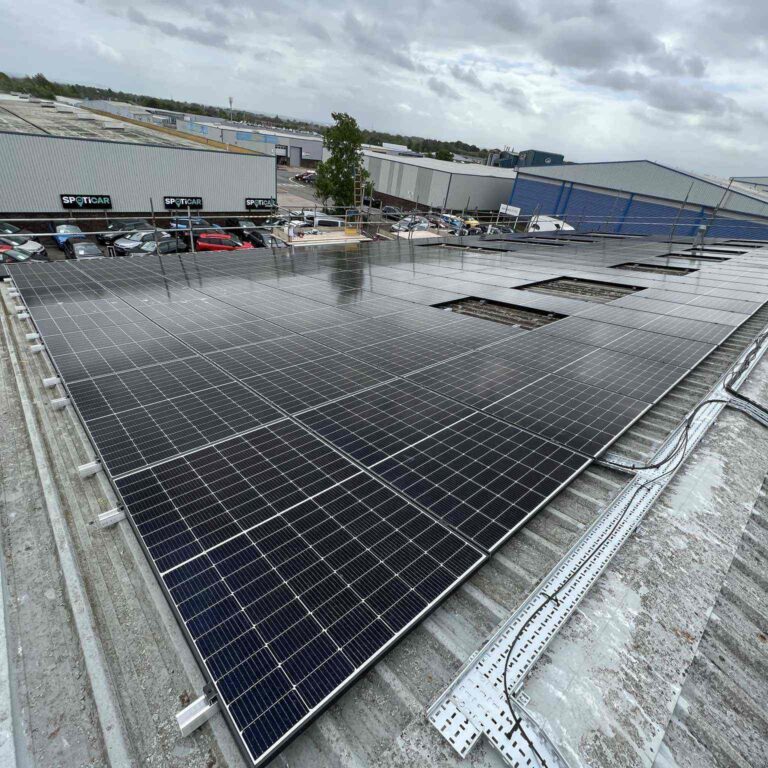As UK businesses navigate the complexities of energy management, commercial battery storage has emerged as a powerful solution to enhance energy efficiency, reduce costs, and support sustainability goals. In an era where energy prices fluctuate and the demand for renewable energy grows, commercial battery storage offers a strategic advantage for companies looking to optimize their energy use. This article explores the benefits, applications, and considerations for UK businesses interested in implementing commercial battery storage solutions.
What is Commercial Battery Storage?
Commercial battery storage involves the use of large-scale batteries to store excess energy generated from renewable sources, such as solar or wind, or during periods of low demand. This stored energy can then be used during peak demand times, helping businesses reduce their reliance on the grid and manage energy costs more effectively. For UK businesses, commercial battery storage is not just about energy efficiency; it’s also about gaining control over energy use and contributing to a more sustainable future.
Benefits of Commercial Battery Storage for UK Businesses
1. Cost Savings and Energy Efficiency
One of the most significant benefits of commercial battery storage is the potential for cost savings. By storing energy when it’s cheap or abundant, businesses can reduce their reliance on the grid during peak hours when energy prices are highest. This strategy, known as peak shaving, can lead to substantial reductions in energy bills. Additionally, commercial battery storage allows businesses to avoid peak demand charges, which are a significant component of energy costs in the UK.
2. Enhanced Energy Resilience
In today’s business environment, energy resilience is crucial. Power outages or fluctuations can disrupt operations, leading to financial losses and decreased productivity. Commercial battery storage provides a reliable backup power source, ensuring that critical operations can continue even during grid failures. This is particularly important for industries where downtime can have severe consequences, such as manufacturing, healthcare, and data centres.
3. Support for Renewable Energy Integration
As more UK businesses commit to sustainability goals, the integration of renewable energy sources has become a priority. However, renewable energy generation is often intermittent, depending on weather conditions. Commercial battery storage addresses this challenge by storing excess energy generated during peak production times, making it available when production is low or demand is high. This capability not only maximizes the use of renewable energy but also enhances the overall efficiency and reliability of energy systems.
4. Contribution to Sustainability Goals
For UK businesses, sustainability is no longer just a buzzword; it’s a critical component of corporate social responsibility (CSR). Implementing commercial battery storage aligns with sustainability goals by reducing carbon emissions and promoting the use of clean energy. By storing and using renewable energy more effectively, businesses can reduce their carbon footprint and demonstrate a commitment to environmental stewardship, which can enhance their brand reputation and appeal to eco-conscious consumers and partners.
5. Potential Revenue Streams
Beyond cost savings, commercial battery storage can also create new revenue streams for businesses. In the UK, businesses can participate in demand response programs, where they are compensated for reducing energy use during peak times or supplying stored energy back to the grid. This not only provides additional income but also supports grid stability, benefiting the broader community.
Applications of Commercial Battery Storage in the UK
1. Manufacturing and Industrial Operations
Manufacturing and industrial operations are energy-intensive, making them ideal candidates for commercial battery storage. By managing energy consumption more effectively, these businesses can reduce operational costs and improve profitability. Moreover, commercial battery storage can provide the backup power needed to maintain production during grid outages, preventing costly disruptions.
2. Commercial Real Estate
For commercial real estate owners and operators, commercial battery storage offers a way to differentiate properties and attract tenants. Buildings equipped with battery storage systems can offer lower energy costs, enhanced energy resilience, and a commitment to sustainability, all of which are increasingly important to tenants. Additionally, battery storage can support the integration of other green technologies, such as solar panels, further enhancing the property’s appeal.
3. Retail and Hospitality
Retailers and hospitality businesses can benefit from commercial battery storage by managing their energy use more efficiently and reducing operating costs. These businesses often experience peak energy demand during specific hours, making them well-suited for peak shaving strategies. Furthermore, commercial battery storage can ensure that essential services, such as lighting, refrigeration, and point-of-sale systems, remain operational during power outages, ensuring a seamless customer experience.
4. Public Sector and Education
Public sector organizations and educational institutions are increasingly focused on sustainability and energy efficiency. Commercial battery storage can help these entities manage their energy use, reduce costs, and achieve their sustainability goals. In addition, the ability to provide backup power can be critical for maintaining essential services in public buildings, schools, and universities.
Key Considerations for Implementing Commercial Battery Storage
1. Assessing Energy Needs
Before implementing commercial battery storage, it’s essential to assess your business’s energy needs. Understanding your energy consumption patterns, peak demand periods, and the potential for renewable energy generation will help determine the size and type of battery storage system required. Working with an experienced energy consultant or commercial battery storage provider can help you conduct a thorough assessment and develop a tailored solution.
2. Evaluating Costs and Incentives
The cost of commercial battery storage systems can vary depending on the size, technology, and complexity of the installation. However, there are various incentives and financing options available in the UK that can make battery storage more affordable. The UK government offers grants, tax incentives, and support through programs such as the Renewable Heat Incentive (RHI) and the Capacity Market. Exploring these options can help offset the initial investment and improve the return on investment.
3. Choosing the Right Technology
There are different types of batteries available for commercial battery storage, each with its advantages and limitations. Lithium-ion batteries are the most common due to their high energy density and long lifespan, but other options, such as flow batteries, may be suitable for specific applications. It’s important to choose the technology that best meets your business’s energy needs, budget, and sustainability goals.
4. Integration with Existing Systems
For businesses already using renewable energy sources, such as solar panels, integrating commercial battery storage with existing systems is a critical consideration. Proper integration ensures that your energy management system operates efficiently, maximizing the benefits of both renewable energy and battery storage. Collaboration with experienced commercial battery storage providers can ensure seamless integration and optimal performance.
5. Maintenance and Monitoring
Like any energy system, commercial battery storage requires regular maintenance to ensure optimal performance and longevity. Monitoring systems can provide real-time data on energy use, battery performance, and potential issues, allowing for proactive maintenance and management. Choosing a provider that offers comprehensive maintenance and monitoring services is essential for long-term success.
Conclusion
Commercial battery storage is a powerful tool for UK businesses looking to reduce energy costs, enhance energy resilience, and support sustainability goals. By storing and managing energy more effectively, businesses can gain greater control over their energy use, reduce their carbon footprint, and even generate new revenue streams. However, successful implementation requires careful planning, the right technology, and ongoing maintenance.
For UK businesses, now is the time to explore the potential of commercial battery storage and take the first steps towards a more sustainable and efficient energy future. Whether you’re a small business looking to reduce costs or a large corporation committed to sustainability, commercial battery storage offers a strategic advantage in today’s energy landscape.



